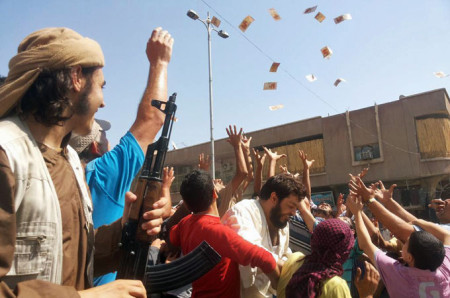UPDATE 1215 GMT: As we expected, the Syrian regime has made its play for international legitimacy by expressing its readiness to cooperate in the fight against the Islamic State.
Foreign Minister Walid al-Muallem said in a news conference in Damascus that Syria is willing to work even with the US and Britain, if “the co-operation is serious and not double standards” as “any violation of Syria’s sovereignty would be an act of aggression”.
Al-Muallem went farther in saying that the Assad regime must be involved in coordinating any airstrikes against the Islamic State.
Damascus had said, even before this week’s capture of the Tabqa Airbase by the jihadists, that it would be at the forefront of a fight against “terrorism”. Information Minister Omran al-Zoubi had offered Syrian help to Iraqi Kurdistan against the Islamic State, and President Assad’s senior advisor Bouthaina Shaaban reiterated the message in interviews with US media last week.
The line is a marked shift from the Assad regime’s position up to June, when it had a tacit non-aggression arrangement with the Islamic State, as the jihadists battled insurgents rather than the Syrian military. However, since then, the regime has lost a series of bases and vital positions to the Islamic State, including all its military complexes in Raqqa Province in northern Syria.
The Syrian regime tried — and largely succeeded — with a similar tactic last summer, turning international pressure into cooperation after its chemical weapons attacks near Damascus that killed hundreds of civilians. Facing escalated support for the insurgency or even foreign intervention, it appealed — through Russia — for an international commission to supervise its handover of chemical weapons stocks.
The Islamic State inflicted a major defeat on the Assad regime on Sunday, capturing the military’s last airbase in Raqqa Province in northern Syria.
After a week of jihadist attacks on the Taqba base, regime defenses suddenly crumbled on Sunday. Islamic State fighters reportedly moved into the south of the base and soon overran the complex as the Syrian military tried to withdraw.
The Islamic State claimed the capture of MiG-21B jets — although they are unlikely to be able to fly them — SA-16 portable anti-aircraft systems, and AIM-9 Sidewinder missiles.
The extent of casualties is still unknown, with unconfirmed claims — including those of a British-based “monitoring group” — of hundreds of jihadists killed and many regime forces slain and executed.
However, the impact of the defeat is clear. With the Islamic State taking all of the regime bases near Raqqa this summer, including those of Division 17 and Brigade 93, Syrian forces in the east in Deir Ez Zor and Hasakeh Provinces are at risk of isolation. Beyond that, the Syrian military’s ability to move troops and to carry out bombing operations — the key to its supremacy on the battlefield — may be curbed across the north.
Islamic State propaganda video of its attacks on regime bases:
The threat to the Assad regime is compounded by an insurgent offensive in Hama Province in central Syria. Opposition forces are within three kilometers of Hama Military Airport, one of the regime’s most important, hitting it with Grad rockets. Operations by jets and helicopters have been curtailed.
As late as Saturday, State TV and websites were proclaiming regime victory at Tabqa, with the jihadist attacks repulsed and “tens of terrorists” killed.
Yesterday State news agency SANA implicitly admitted the defeat on its Arabic-language site, saying that a successful evacuation had been carried out and Islamic State fighters were still being killed with “precision strikes”.
However, SANA makes no reference to Tabqa on its English-language site.
(Featured Photo: Fighters in Raqqa celebrate news of victory at the Tabqa Airbase)

